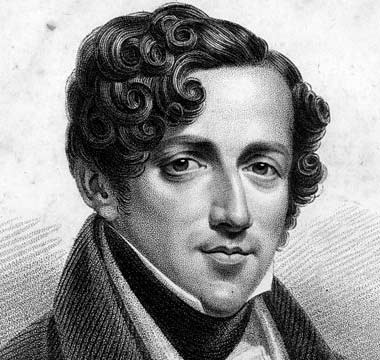Meyerbeer, Giacomo (1791–1864)

While the operas of Rossini, Donizetti, Bellini, and Weber have all to some extent held their place in the repertoire, those of Giacomo Meyerbeer have been revived only occasionally over the past century. In his own time, however, Meyerbeer was one of the most successful opera composers and one of the richest men in Europe. This inevitably provoked envious sniping from his less fortunate colleagues – particularly Wagner, who launched a vitriolic attack on Meyerbeer in his anti-Semitic pamphlet Das Judenthum in der Alusik (1850).
Child prodigy
Meyerbeer was a truly cosmopolitan figure. Born in Berlin, into the same affluent, cultured, Jewish milieu as his younger contemporary Mendelssohn, Jakob Liebmann Beer (as he was originally called) showed early promise as a pianist, appearing as soloist in a performance of a Mozart concerto at the age of 11. He began writing German operas while still in his teens.
From 1816 he spent nine years in Italy, where he wrote six operas in the style of Rossini. The last of these, Il crociato in Egitto (The Crusader in Egypt, 1824), was subsequently staged with equal success in London and Paris, where Meyerbeer met the librettist Eugene Scribe (1791–1861). From then onwards, Paris became the focus of Meyerbeer's activities, although he never lived there permanently. In the 1840s he was appointed Generalmusikdirektor in Berlin, where he wrote a Singspiel for the Swedish soprano Jenny Lind (1820–1887).
Grand opera
Meyerbeer's reputation rests on the "grand operas" he created for the Paris Opera in collaboration with Scribe, beginning with Robert le diable (Robert the Devil) in 1831, continuing with Les Huguenots and Le prophète, and ending with L'Africaine (premiered posthumously in 1865). All were staged with spectacular and innovative effects, such as storms, ships sinking on stage, and massive crowd scenes.
Unlike Rossini, Meyerbeer was not a fast worker, and his productions were eagerly awaited. He wrote with specific voices in mind, and was always searching for new vocal and orchestral timbres.


